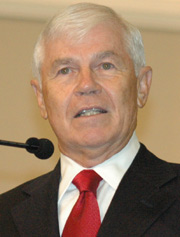Cooperative Program definition sparks messenger debate
Posted: 6/13/07
Cooperative Program definition
sparks messenger debate
By Trennis Henderson
Kentucky Western Recorder
SAN ANTONIO—A proposal to define what constitutes Cooperative Program giving sparked lengthy debate during the opening session of the Southern Baptist Convention annual meeting, including a charge that the measure “goes against historical Baptist polity.”
The recommendation from the SBC Executive Committee defines the denomination’s 82-year-old giving plan as “Southern Baptists’ unified plan of giving through which cooperating Southern Baptist churches give a percentage of their undesignated receipts in support of their respective state conventions and the Southern Baptist Convention missions and ministries.”
SBC Executive Committee President Morris Chapman noted, “There has been no approved definition of the Cooperative Program through these years.”
Southern Baptists “always considered the Cooperative Program since 1925 to be a process, a delivery system that is contributed through the state and then to the SBC,” he said. Designated funds given directly to the SBC still are distributed according to the national CP funding formula but are not counted as Cooperative Program contributions.
The proposal follows a measure on strengthening Cooperative Program giving adopted last year by SBC messengers. From 1980 to 2006, the percentage of undesignated funds given by local churches through Cooperative Program plunged from 10.7 percent to 6.6 percent.
At least 10 messengers recognized at microphones throughout the convention hall raised questions or voiced concerns about the proposal.
Ron Wilson of Thousand Oaks, Calif., warned that the recommendation “seems to be establishing a connectionalism that historically has not existed in Baptist life.”
“What if you have three entities in a state all desiring to give to the Cooperative Program?” he asked. “In our state, we’re forming a new convention for the purpose of giving a greater percentage to the national convention. Will we be allowed to do that or will we have to go back to the old convention?”
Michael Lewis, vice chairman of the Executive Committee’s Cooperative Program subcommittee, responded that if a new state convention entity is recognized by the SBC, contributions through the entity will be considered CP gifts.
Currently in Southern Baptist life, the SBC has recognized breakaway fundamentalist conventions in Texas and Virginia. A breakaway moderate convention in Missouri is not recognized by the SBC.
Lewis emphasized that the primary focus of the proposal is to acknowledge “local churches giving through their state convention to support the Cooperative Program.”
Mark Dever of Washington, D.C., asked if the proposed definition would impact current constitutional wording that allows cooperating churches to qualify for additional messengers “for each $250 paid to the work of the convention during the fiscal year preceding the annual meeting.”
“The recommendation does not affect that,” Lewis said, noting that designated gifts qualify as support for convention causes.
“Are we saying that if you give to the Executive Committee or to Nashville that you can bypass your state convention and it still count as Cooperative Program funds?” asked Bill Henard of Lexington, Ky.
“No, it does not,” Lewis responded. “It simply codifies all that we are doing and have been doing as Southern Baptists through the Cooperative Program.”
Tim Rogers of North Carolina asked whether contributions to a giving plan in the North Carolina Baptist Convention that includes designated giving to the Cooperative Baptist Fellowship would qualify as Cooperative Progam giving.
“No,” Lewis said. “We do not receive funds from the Cooperative Baptist Fellowship.”
After several other questions, Wilson returned to the microphone to propose tabling the measure until next year.
“I think it needs greater thought for there’s more issues than just what you’re dealing with,” Wilson said. “I also believe that historically we are establishing a precedent that absolutely goes against historical Baptist polity and establishes a connectionalism that was not meant in the beginning.”
Urging convention leaders to “table this motion and bring it back next year with better wording,” Wilson added, “This is a very dangerous thing we are doing here.”
SBC President Frank Page ruled Wilson’s motion to table out of order. Messengers then voted to approve the proposed Cooperative Program definition.
In other Executive Committee-related business, messengers:
• Approved a 2007-08 CP allocation budget of $200,601,536, an increase of more than $4.6 million from the current budget.
• Requested LifeWay Christian Resources to “compile additional statistics relating to Calvinism, the emergent church, elder rule and other topics of interest and discussion in Southern Baptist life.”
• Approved three future convention sites: Orlando, Fla., in 2010; Phoenix in 2011; and New Orleans in 2012. Some messengers voiced concern about waiting five years to visit New Orleans, citing ongoing ministry needs and witnessing opportunities in the wake of Hurricane Katrina. Convention officials responded that logistics and facility options make it necessary to wait until 2012.
• Gave final approval to a constitutional amendment that requires a two-year waiting period before former board trustees or Executive Committee members are eligible to serve again. There previously was a one-year wait.
News of religion, faith, missions, Bible study and Christian ministry among Texas Baptist churches, in the BGCT, the Southern Baptist Convention ( SBC ) and around the world.

